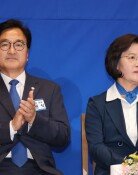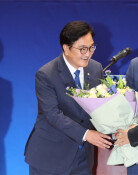District court chiefs resignation should not be the end
District court chiefs resignation should not be the end
Posted March. 31, 2014 02:55,
Jang Byeong-woo, the chief of Gwangju District Court, resigned after he sentenced former Daejoo Group Chairman Huh Jae-ho so-called an emperors labor costing 500 million won (467,730 U.S. dollars) per day in the court of appeals. Jang moved into a 188 square meter apartment sold by Daejoo Construction in May 2007, and sold the apartment to HH Development, an affiliate of the Daejoo Group, at 250 million won (233,800 dollars) five months later. As the transaction was known to the public and he was under criticism over the inappropriate relationship, he submitted a letter of resignation via fax to the Supreme Court.
Jang said, I have never taken any profit in the course of the acquisition or disposal of the apartment. This can be easily verified as he has bank loan documents for the purchase of the apartment, which he bought at 450 million won (420,900 dollars). The affiliate of the Daejoo Group, however, was under court receivership in 2007 and 2008, and he was a judge of the Gwangju District Court presiding over court receivership. It is doubtful in that the affiliate bought back the apartment of the judge in charge of corporate bankruptcy. The year of 2007 was a period when the real estate market was in recession, and many people were not able to move in due to lack of apartment transactions. There is a possibility that the Daejoo Group provided convenience to the judge, if not a favor.
Though Jang said, I deeply apologize for causing criticism, it is not enough. The Supreme Court should not simply take his resignation but find facts. According to the Established Rule on the Limitation of Resignation of a Judge at His Own Request, a judge who is under investigation cannot resign at his own request in principle. The Supreme Court should consider sending him to the commission on judicial discipline.
Many people sympathize with Jang who served as a local judge for 29 years in Gwangju and South Jeolla Province, saying, He could not ignore petitions and appeals upon his ruling. When the former Daejoo Group chairman was investigated by prosecutors, local government heads and businessmen submitted a petition appealing for generosity. The scandal over the emperors labor proves that it is a problem resulting from the interconnected network of local judges, the local community, and even local prosecutors. The fairness of a judiciary system is a key to the peoples trust in the country. The Supreme Court headed by Chief Justice Yang Seung-tae should root out the corruption in the connection of local judges and prosecutors, local power, and local governments.







